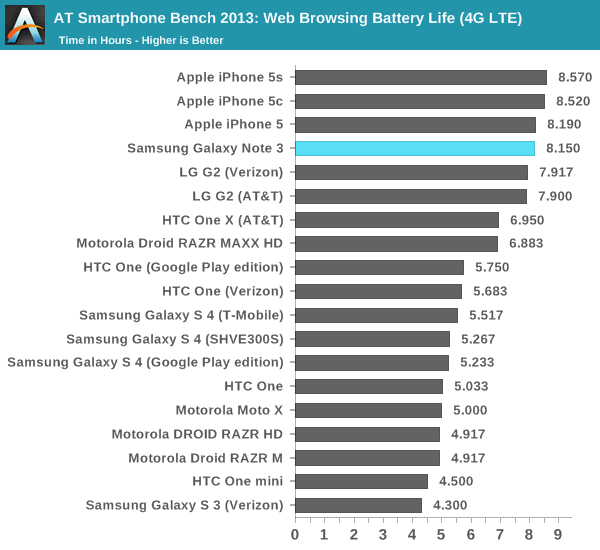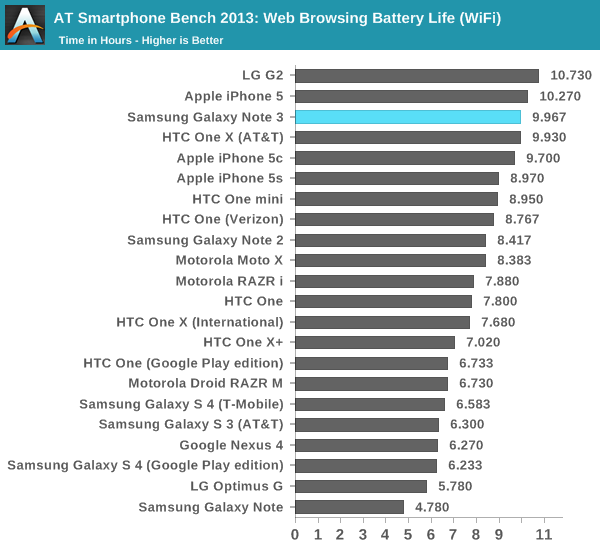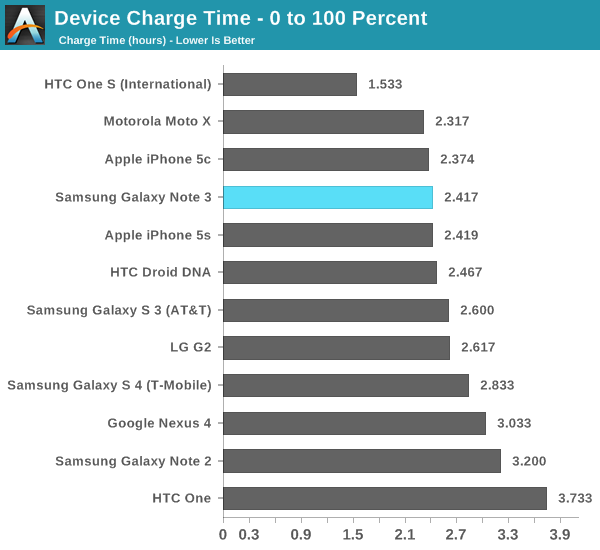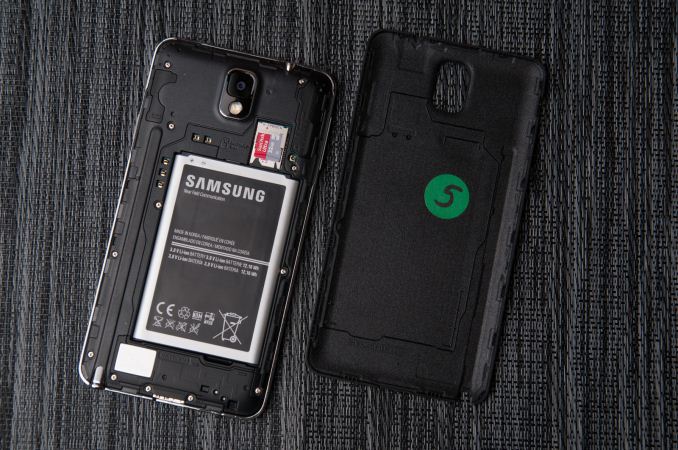Samsung Galaxy Note 3 Review
by Brian Klug on October 1, 2013 9:00 AM EST- Posted in
- Smartphones
- Samsung
- Mobile
- Android 4.3
- galaxy note 3
Battery Life
Battery life remains probably the single largest differentiator for devices lately, and of huge concern to enthusiasts and normal shoppers alike. We’ve already caught a glimpse of how well 8974 fares from a power perspective inside the LG G2, a device that posted some seriously impressive battery numbers. The Note 3 we’re looking at is also 8974 based since it’s a T-Mobile model, and thus we expect the same kind of battery life.
With this generation of Note, battery gets even larger. The Note started with a then quite large 9.25 watt hour battery, then Note 2 moved to 11.78 watt hours, and Note 3 now moves to a very large 12.16 watt hour battery with of course the newest 3.8V chemistry and all that comes along with it. Display size goes up, but those power gains are offset in other places.
After we talked about the panel self refresh features in the G2 a few people reached out and let me know that this feature has been shipping for a while in some phones, and it’s easy to check for. If we look under the display subsystem we can see that the same MIPI_CMD_PANEL type 9 is used, which refers to this type of interface.
Qualcomm HWC state: MDPVersion=500 DisplayPanel=9
define MIPI_CMD_PANEL ‘9’
Our battery life tests are unchanged and consist of a set of popular webpages that are loaded on a schedule with the display set to exactly 200 nits and repeated until the battery runs out and the device dies on both WiFi and cellular data connections. In this case that means T-Mobile LTE which is 10 MHz FDD in my market, I haven’t had a chance to run the Note 3 on HSPA+ yet, or complete the call test (which is starting to get ridiculous, and probably breaks 24 hours in the case of the Note 3).

On LTE the Note 3 does very well, coming just shy of the pack of iPhones, at just over 8 hours. Interestingly enough it’s just north of the G2s as well, which do have a smaller battery but also smaller display. The Note 3 also is the first device to ship with Qualcomm’s QFE1100 envelope tracker solution from the RF360 front end portfolio, which lowers power consumption by up to 20 percent and heat dissipation by up to 30 percent by allowing the power amplifiers to follow the desired output waveform. There’s more on that later in the cellular section.

On WiFi the Note 3 does better by 22 percent, but not the kind of huge jump I’m used to seeing between cellular and WiFi testing. This tells me the Note 3 battery life is really gated by the display, which is almost always the largest consumer of power in a device. That said the Note 3 does very well all things considered, especially in comparison to the APQ8064 (Fusion 3) phones which came before it, like SGS4. New silicon and new process inside MSM8974 definitely helps move battery life forward here with the race to sleep game.
Charging is an interesting story on the Note 3, but primarily because of what doesn’t change. The Note 3 continues to use Samsung’s tablet charging specification and charger, which has 2 amps of maximum output. The Note 3 draws 2 amps over a considerable amount of the charging curve, like other Samsung devices (in the linear part of the charge curve). USB 3.0 doesn’t change things up here quite yet with the new supported charge voltages that are coming eventually with the power delivery specification.

The Note 3 does charge faster overall compared to the SGS4 however thanks in part to the new PMIC (PM8941) which is part of the overall 8974 platform story.











302 Comments
View All Comments
cupholder - Tuesday, October 1, 2013 - link
How is it cheating if everyone does it? Considering phone benchmarks should be used as a comparative rather than an absolute, it really should not matter in the end.PeterBe - Tuesday, October 1, 2013 - link
Is it cheating? If you had bought one of these with your own money -- being an Android fan, gadget hound and hoping to get the best -- would you not feel a little cheated? No? Wow!Braumin - Tuesday, October 1, 2013 - link
You can ask Ben Johnson or Lance Armstrong the same thing. In the end, they were still cheating even though everyone else was as well.DERSS - Wednesday, October 2, 2013 - link
Obviously, not "everyone".LG does not do it, and this is the only reason why LG G2 "lags" in tests, while in reality the SoC and the frequency are IDENTICAL.
shadowofthesun - Thursday, October 3, 2013 - link
http://www.anandtech.com/show/7384/state-of-cheati...Misinformed indignation is always adorable...
darwinosx - Tuesday, October 8, 2013 - link
You can't be serious.Spunjji - Tuesday, October 8, 2013 - link
Biscuit.doobydoo - Saturday, October 19, 2013 - link
It would still be cheating even if everyone did it.But everyone DOESN'T do it.
So it's an irrelevant question.
doobydoo - Saturday, October 19, 2013 - link
And you can only use them as a comparative measure accurately if the manufacturers aren't cheating.bigpics - Wednesday, October 2, 2013 - link
In education it's called "teaching to the test"... ...for the standardized ones the kids take once a year. Even a bigger scandal. By far.